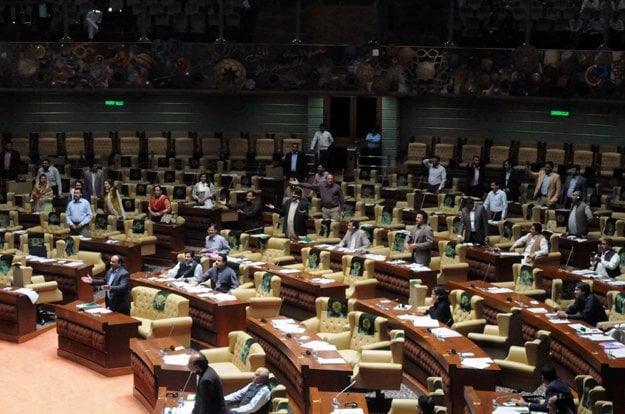The Sindh Assembly approved on Monday the amendment bill of universities 2025, despite the strong objections of opposition legislators. The bill, which had been previously returned by the governor, was reintroduced and approved after a heated debate.
The members of the Muttahida Qaumi-Pakistan movement (MQM-P) and Pakistan Tehreek-E-Insaf (PTI) strongly opposed the bill, singing slogans and creating interruptions in the assembly. Despite the objections of the opposition, the Minister of Parliamentary Affairs, Zia-Ul-Hassan Lanjar, presented the bill, which was subsequently approved by the Assembly.
The members of the opposition, including the legislators of MQM-P and PTI, rushed to the Estrado of the speaker in protest, expressing their opposition to the bill. The opposition also organized a strike in response to the approval of the bill. Sindh’s information minister Sharjeel Inam Memon criticized opposition actions, accusing them of protesting without understanding the content of the bill. He also commented that MQM and PTI had formed an alliance in the Assembly.
The Sindh Assembly also discussed the bill of the amendment of the civil courts of Sindh (reviewed), which had been previously approved but that the governor returned with objections. The Assembly approved both bills, with opposition protests that continue during the session.
The controversial bill allows senior bureaucrats in grade 21 or higher, with at least four years of experience and a relevant mastery, be designated as Vice Chancellor (VC) of universities of the public sector in Sindh. However, a doctorate for VC position is still required at engineering universities.
The bill also includes provisions on the resignation or retirement of bureaucrats looking for the VC position and establishes an age limit for applicants.
This decision has caused generalized criticisms of academic and teaching associations, who argue that a doctorate must continue to be the minimum qualification for the VC position, particularly for general universities. They have expressed concern that designating bureaucrats with administrative history could undermine the academic integrity of universities.
Governor Kamran Tessori had previously expressed concerns about the bill, stating that the guidelines of the Higher Education Commission (HEC) require that VC be academic, not bureaucrats. Despite these objections, the Provincial Cabinet of Sindh rejected the governor’s concerns and sent the bill to the assembly for approval.
The approval of the bill is seen as part of broader efforts by the provincial government led by the Pakistan peoples party to reform the university leadership criteria.
However, critics warn that the law could damage the quality of higher education in Sindh by allowing people without academic qualifications to assume the role of VC.
The Sindh assembly session was postponed indefinitely after the heated debates and protests.




